高中英语必修三第二单元知识点总结
高中英语必修三第二单元知识点总结
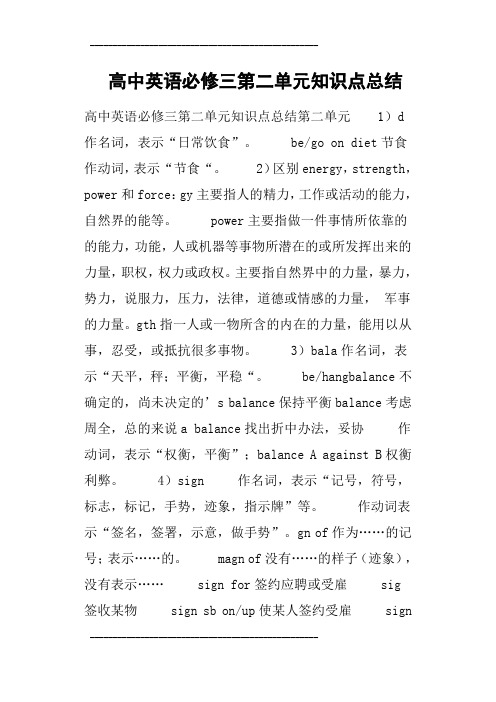
高中英语必修三第二单元知识点总结高中英语必修三第二单元知识点总结第二单元 1)d 作名词,表示“日常饮食”。
be/go on diet节食作动词,表示“节食“。
2)区别energy,strength,power和force:gy主要指人的精力,工作或活动的能力,自然界的能等。
power主要指做一件事情所依靠的的能力,功能,人或机器等事物所潜在的或所发挥出来的力量,职权,权力或政权。
主要指自然界中的力量,暴力,势力,说服力,压力,法律,道德或情感的力量,军事的力量。
gth指一人或一物所含的内在的力量,能用以从事,忍受,或抵抗很多事物。
3)bala作名词,表示“天平,秤;平衡,平稳“。
be/hangbalance不确定的,尚未决定的’s balance保持平衡balance考虑周全,总的来说a balance找出折中办法,妥协作动词,表示“权衡,平衡”;balance A against B权衡利弊。
4)sign 作名词,表示“记号,符号,标志,标记,手势,迹象,指示牌”等。
作动词表示“签名,签署,示意,做手势”。
gn of作为……的记号;表示……的。
magn of没有……的样子(迹象),没有表示…… sign for签约应聘或受雇 sig签收某物 sign sb on/up使某人签约受雇 sign __________________________________________________up(for sth)注册参加(俱乐部,课程) 5)siggh over… 为……叹息 sigh for想念,思念 sighout/边叹息边说出…… 6)slim 作形容词,表示“苗条的,纤细的,小的”。
作动词,表示“变细,减肥”。
slim down减肥,缩减。
7)lie 作名词,表示“谎言,谎话,假象”是可数名词。
若表示说谎,只能使tell lies或者tell a lie。
a white lie无恶意的谎言w a lie in sb’s face当面斥责某人说谎 give the lie to证明……不真实live a lie过骗人的生活作动词,表示“说谎”。
高一英语必修3知识点unit2
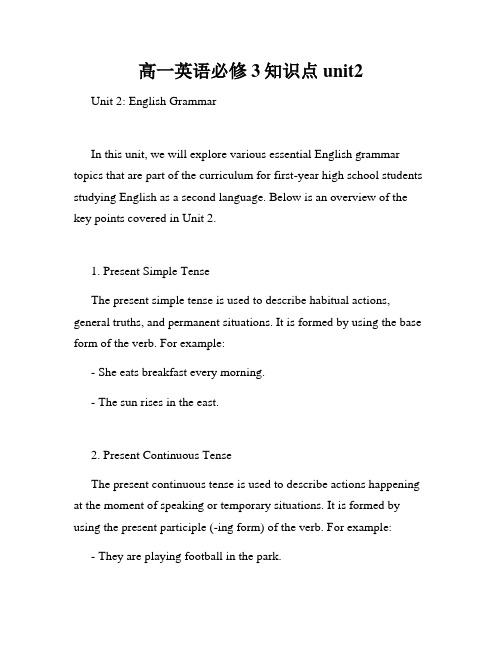
高一英语必修3知识点unit2 Unit 2: English GrammarIn this unit, we will explore various essential English grammar topics that are part of the curriculum for first-year high school students studying English as a second language. Below is an overview of the key points covered in Unit 2.1. Present Simple TenseThe present simple tense is used to describe habitual actions, general truths, and permanent situations. It is formed by using the base form of the verb. For example:- She eats breakfast every morning.- The sun rises in the east.2. Present Continuous TenseThe present continuous tense is used to describe actions happening at the moment of speaking or temporary situations. It is formed by using the present participle (-ing form) of the verb. For example:- They are playing football in the park.- She is currently studying for her exams.3. Past Simple TenseThe past simple tense is used to describe completed actions in the past. Regular verbs form the past tense by adding "-ed" to the base form of the verb, while irregular verbs have their unique forms. For example:- He walked to school yesterday.- They ate pizza for dinner last night.4. Past Continuous TenseThe past continuous tense is used to describe an ongoing action in the past. It is formed by using the past tense of "to be" (was/were) and the present participle (-ing form) of the main verb. For example:- I was watching TV when you called.- They were playing tennis at that time.5. Adverbs of FrequencyAdverbs of frequency describe how often an action occurs. They are commonly used with the present simple tense. Some examples are:- She always arrives on time.- They rarely go to the movies.6. Future TenseThe future tense is used to talk about actions that will happen in the future. It can be formed using "will" followed by the base form of the verb or by using "be going to" followed by the base form of the verb. For example:- I will visit my grandparents next weekend.- They are going to have a party next month.7. Modal VerbsModal verbs are auxiliary verbs used to express ability, possibility, necessity, permission, and advice. Some commonly used modal verbs include can, could, may, might, must, shall, should, will, would. For example:- You must finish your homework before watching TV.- She should study for the test if she wants to do well.8. Relative ClausesRelative clauses provide additional information about a noun in the main clause. They are introduced by relative pronouns such as who, whom, whose, which, and that. For example:- The book that I bought is very interesting.- The girl who is sitting next to me is my best friend.These are the main grammar points covered in Unit 2 of the first-year high school curriculum. Understanding and practicing these concepts will significantly improve your English language skills. Make sure to review and apply them in your speaking and writing to enhance your overall proficiency.。
(新教材)人教版 2019 高中英语必修三 第二单元(知识点总结全)
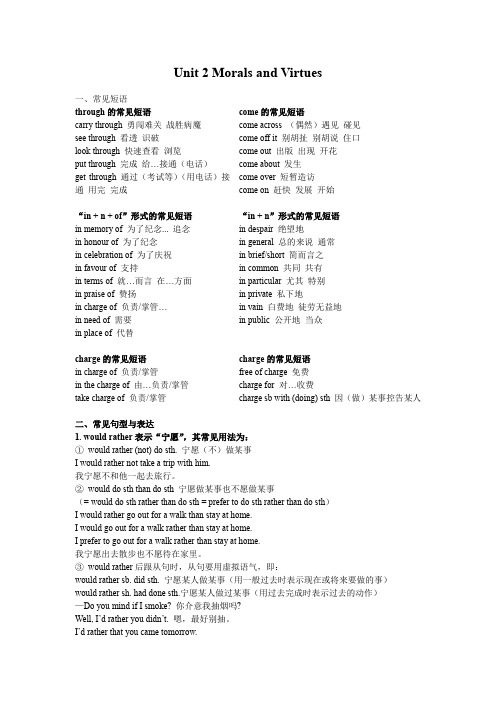
Unit 2 Morals and Virtues 一、常见短语through的常见短语carry through 勇闯难关战胜病魔see through 看透识破look through 快速查看浏览put through 完成给…接通(电话)get through 通过(考试等)(用电话)接通用完完成come的常见短语come across (偶然)遇见碰见come off it 别胡扯别胡说住口come out 出版出现开花come about 发生come over 短暂造访come on 赶快发展开始“in + n + of”形式的常见短语in memory of 为了纪念... 追念in honour of 为了纪念in celebration of 为了庆祝in favour of 支持in terms of 就…而言在…方面in praise of 赞扬in charge of 负责/掌管…in need of 需要in place of 代替“in + n”形式的常见短语in despair 绝望地in general 总的来说通常in brief/short 简而言之in common 共同共有in particular 尤其特别in private 私下地in vain 白费地徒劳无益地in public 公开地当众charge的常见短语in charge of 负责/掌管in the charge of 由…负责/掌管take charge of 负责/掌管charge的常见短语free of charge 免费charge for 对…收费charge sb with (doing) sth 因(做)某事控告某人二、常见句型与表达1. would rather表示“宁愿”,其常见用法为:①would rather (not) do sth. 宁愿(不)做某事I would rather not take a trip with him.我宁愿不和他一起去旅行。
人教高中英语必修三 Unit 2--知识点详解全
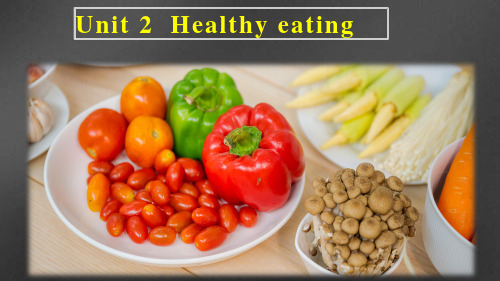
第一 讲
MAIN CONTENTS ✓ 1. 核心词汇 ✓ 2. 句子控 ✓ 3. Have a try
PART ONE Vacabulary & Phrase
核心词汇
[教材P9原句] Food that helps the body fight diseases (eg, protective
diet?
假如你的饮食不均衡 天平;平衡;结余,余额
v. 平衡;权衡
balanced a d j . 保持(或显示)平衡的
a balanced diet 均衡的饮食
keep one's balance 保持平衡 lose one's balance 失去平衡 balance A and/with B 平衡A和B
curiosity n. 好奇心,求知欲
curious
adj. 好奇的,有求知欲的;古怪的
out of curiosity
出于好奇
satisfy one's curiosity 满足某人的好奇心
with/in curiosity
好奇地
be curious about
对……好奇
be curious to know/see/hear sth. 想知道/看看/听听某事
[教材P10原句] By now his restaurant ought to be full of people.
到现在他的餐馆应该挤满了人。
ought to 应该,应当
ought to与should意思接近,大多数情况下二 者可以互换,但是should谈的是自己的主观看 法,ought to则更多反映客观情况,在谈到法 律、义务和规定时使用
【高中英语教材知识梳理】必修三 Unit 2
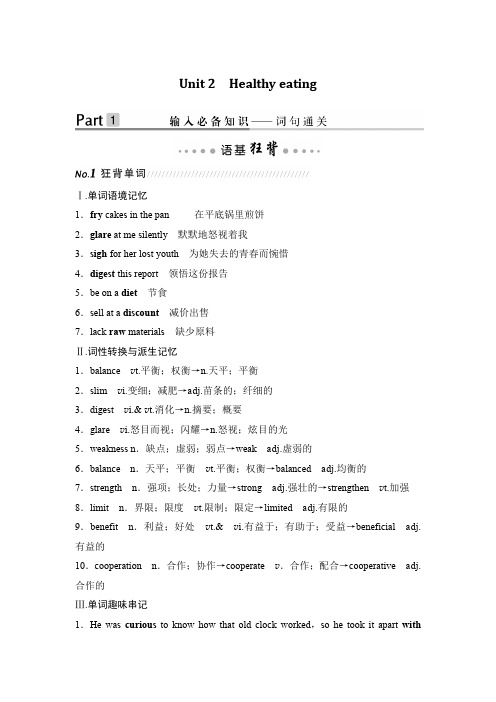
Unit 2Healthy eatingⅠ.单词语境记忆1.fry cakes in the pan 在平底锅里煎饼2.glare at me silently 默默地怒视着我3.sigh for her lost youth 为她失去的青春而惋惜4.digest this report 领悟这份报告5.be on a diet节食6.sell at a discount减价出售7.lack raw materials 缺少原料Ⅱ.词性转换与派生记忆1.balance v t.平衡;权衡→n.天平;平衡2.slim v i.变细;减肥→adj.苗条的;纤细的3.digest v i.& v t.消化→n.摘要;概要4.glare v i.怒目而视;闪耀→n.怒视;炫目的光5.weakness n.缺点;虚弱;弱点→weak adj.虚弱的6.balance n.天平;平衡v t.平衡;权衡→balanced adj.均衡的7.strength n.强项;长处;力量→strong adj.强壮的→strengthen v t.加强8.limit n.界限;限度v t.限制;限定→limited adj.有限的9.benefit n.利益;好处v t.& v i.有益于;有助于;受益→beneficial adj.有益的10.cooperation n.合作;协作→cooperate v.合作;配合→cooperative adj.合作的Ⅲ.单词趣味串记1.He was curious to know how that old clock worked,so he took it apart withcuriosity and examined it curiously.他对那个老钟表是如何工作的很好奇,因此,他好奇地把它拆开了并好奇地研究起来。
2.The tall man was a spy,who had been given the task of spying on the woman and spying out her identity.那个高个子男人是个间谍,他受命监视那个女人并且查清楚她的身份。
(完整版)高中英语必修三第二单元知识点详解
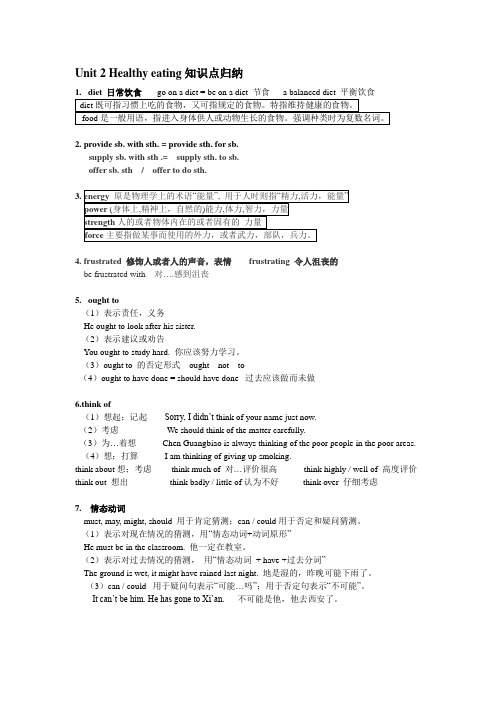
Unit 2 Healthy eating知识点归纳2. provide sb. with sth. = provide sth. for sb.supply sb. with sth .= supply sth. to sb.offer sb. sth / offer to do sth.4. frustrated 修饰人或者人的声音,表情frustrating 令人沮丧的be frustrated with 对….感到沮丧5. ought to(1)表示责任,义务He ought to look after his sister.(2)表示建议或劝告You ought to study hard. 你应该努力学习。
(3)ought to 的否定形式ought not to(4)ought to have done = should have done 过去应该做而未做6.think of(1)想起;记起Sorry, I didn’t t hink of your name just now.(2)考虑We should think of the matter carefully.(3)为…着想Chen Guangbiao is always thinking of the poor people in the poor areas. (4)想;打算I am thinking of giving up smoking.think about想;考虑think much of 对…评价很高think highly / well of 高度评价think out 想出 think badly / little of认为不好think over 仔细考虑7. 情态动词must, may, might, should 用于肯定猜测;can / could用于否定和疑问猜测。
(1)表示对现在情况的猜测,用“情态动词+动词原形”He must be in the classroom. 他一定在教室。
人教版高中英语必修3Unit2知识点详解
Part1.Warmingup1.dietn.日常饮食;食物Itisimportanttohaveabalanced,healthydiet.均衡、健康的日常饮食很重要。
搭配beonadiet在节食goonadiet节食putadiet限制某人的饮食Nosugarinmycoffee,please;I’mdieting.请不要给我的咖啡放糖,我在节食。
②(牛津P552)Idecidedtogo_on_a_dietbeforemyholiday.我决定在休假前节食。
③Itisimportanttohave_a_balanced,healthy_diet.拥有均衡、健康的饮食很重要。
④Thedoctorp uthimonadietafteroperation.手术之后,医生规定了他的饮食。
2.Whatwillhappentoyouifyoudon ’teatabalanceddiet?假设你的饮食不均衡会怎么样?balancen平衡;天平v.平衡;权衡Ithinkit ’simportantforacollegestudenttohaveabalancebetwenstudyandasociallife.我认为一个大学生在学习与社会生活之间保持平衡是很重要的。
Youhavetobalancetheadvantagesoflivingdowntownagainstthedisadvantages. 你必须权衡住在市中心的利弊。
Onbalance,thecompanyhashadasuccessfulyear.总的来说,公司这一年是成功的。
根据提示,完成以下句子。
(1)Seeingacarcomingatacrossing,sheandfelldownfromherbike.(2)Thekeytolearningskatingisto lostherbalancekeepthebalancePart2.Pre-reading,readingandcomprehending (失去平衡(保持平衡).)WangPengweisatinhisemptyrestaurantfeelingveryfrustrated.feeling这里是用动词的-ing形式做伴随状语。
人教版高中英语必修三unit2常考知识点
Unit2 Healthy eatingⅠ. 单句语法填空1.Many people have come to realize that they should go on __a__ balanced diet and make room in their day for exercise.解析:句意:许多人已经意识到他们应该保持平衡的饮食,而且每天留时间进行锻炼。
a balanced diet平衡的饮食。
2.—How was your recent trip to Sichuan?—I've never had a __more__ pleasant one before.解析:考查形容词的比较级。
句意:——你最近去四川的旅行怎么样?——这是让我最为愉快的旅行了。
否定词never与比较级a more pleasant构成最高级的含义。
3.—In this day and age, women can have children and jobs as well.—I can't agree more.It's great to have the two__combined__(combine).解析:句意:——在现在这个年代,妇女可以兼顾养育子女与工作。
——我非常同意。
把这两者结合起来是非常棒的。
4.Since nobody gave him any help, he __must__ have done the research on his own.解析:本题考查情态动词的用法。
句意:因为没有人帮助他,他一定是自己独立完成的研究。
must have done表示对过去事实的肯定推测。
5.While prices are rising so fast,many people are working out ways to cut __down__their expenses.解析:句意:当价格飞涨时,许多人做出了削减费用的举措。
高中英语必修三Unit 2 Morals and Virtues知识点归纳(单词、短语、句型、语法)
Unit 2 Morals and Virtues重点知识归纳总结(单词+短语+句子+语法)一、重点单词和短语1. carry sb through sth 帮助某人渡过难关教材原句These words of Dr Lin Qiaozhi give us a look into the heart of this amazing woman, and what carried her through a life of hard choices.林巧稚医生的这番话让我们可以窥见这位了不起的女性的内心世界,以及是什么支持她度过充满艰难抉择的一生。
●Her confidence carried her through.自信心帮助她渡过了难关。
《朗文当代》联想拓展含有carry的其他常用短语carry on继续carry out执行;实行●It was important to carry out the work quickly.赶快开展这些工作是重要的。
2. majority n.大部分;大多数教材原句At age 18, instead of following the traditional path of marriage like the majority of girls, she chose to study medicine.18岁时,她没有像大多数女孩那样遵循传统的婚姻道路,而是选择了学医。
常用搭配be in the majority占多数the majority of... =most (of)... 大多数……●In the nursing profession, women are in the majority.女性在护理行业中占大多数。
特别注意当“the majority of+名词”作主语时,其后的谓语动词的数取决于of之后的名词;当the majority单独作主语时,如果强调整体,谓语动词用单数形式,如果强调个体,谓语动词用复数形式。
人教版高中英语必修第三册 Unit 2 Morals and Virtues 单元重点小结
adj.遥远的
23. elect vt.选举;推选
→ election n.选举;推选;当选
24. decade n.十年;十年期
25. elsewhere
adv.在别处;去别处
26. tend vt.照顾;照料 vi.倾向;趋于
→ tendency
n.趋势
27. publish
vt.发表(作品);出版
本课结束
50. memory n.记忆力;回忆
51. chain
n.一连串(人或事);链子;链条
52. pregnant
adj.怀孕的;妊娠的
53. disguise
vt.装扮;假扮;掩盖 n.伪装;化装用具
54. spill vt.& vi.(使)洒出,(使)溢出
55. limp vi.跛行;一瘸一拐地走
11. tuition
n.(小组)教学;讲课
12. fee
n.专业服务费;报酬
13. respond vt.回答;回复 vi.做出反应;回应
→ response n.反应;回答;回复
14. union n.协会;联合会;工会
15. scholarship n.奖学金
16. hire
vt.聘任;雇用;租用 n.租借;租用
5.
tend to do sth
6.
first aid
7.
pass away
8.
in memory of
9.
trip over
10.
in tears
11.
in despair
12.
a great deal(of)
道德困境 帮助某人渡过难关
- 1、下载文档前请自行甄别文档内容的完整性,平台不提供额外的编辑、内容补充、找答案等附加服务。
- 2、"仅部分预览"的文档,不可在线预览部分如存在完整性等问题,可反馈申请退款(可完整预览的文档不适用该条件!)。
- 3、如文档侵犯您的权益,请联系客服反馈,我们会尽快为您处理(人工客服工作时间:9:00-18:30)。
高中英语必修三第二单元知识点总结第二单元
)diet
作名词,表示“日常饮食”。
be/goondiet节食
作动词,表示“节食“。
2)区别energy,strength,power和force:
energy主要指人的精力,工作或活动的能力,自然界的能等。
power主要指做一件事情所依靠的的能力,功能,人或机器等事物所潜在的或所发挥出来的力量,职权,权力或政权。
force主要指自然界中的力量,暴力,势力,说服力,压力,法律,道德或情感的力量,军事的力量。
strength指一人或一物所含的内在的力量,能用以从事,忍受,或抵抗很多事物。
3)balance
作名词,表示“天平,秤;平衡,平稳“。
be/hanginthebalance不确定的,尚未决定的
keepone’sbalance保持平衡
onbalance考虑周全,总的来说
strikeabalance找出折中办法,妥协
作动词,表示“权衡,平衡”;balanceAagainstB权衡利弊。
4)sign
作名词,表示“记号,符号,标志,标记,手势,迹象,指示牌”等。
作动词表示“签名,签署,示意,做手势”。
insignof作为……的记号;表示……的。
makenosignof没有……的样子(迹象),没有表示……
signfor签约应聘或受雇
signforsth签收某物
signsbon/up使某人签约受雇
signup注册参加(俱乐部,课程)
5)sigh
sighover…为……叹息
sighfor想念,思念
sighout/forthsth边叹息边说出……
6)slim
作形容词,表示“苗条的,纤细的,小的”。
作动词,表示“变细,减肥”。
slimdown减肥,缩减。
7)lie
作名词,表示“谎言,谎话,假象”是可数名词。
若表示说谎,只能使telllies或者tellalie。
awhitelie无恶意的谎言
throwalieinsb’sface当面斥责某人说谎givethelieto证明……不真实
livealie过骗人的生活
作动词,表示“说谎”。
lieone’swayinto/outof靠撒谎得到某物liesboutofsth从某人处骗取某物
lieinone’steeth/throat睁着眼睛说瞎话lieliedlied说谎
lielaylain位于,躺着,平方
laylaidlaid放置,产卵
8)rid
ridsb/sthof…使某人或某物摆脱……
getridof摆脱,除出
beridof=ridoneselfof除去,摆脱
9)amount
alargeamountof大量的(后跟不可数名词)noamountof再多的……也不……
作不及物动词,表示“总计,等于”后跟介词to。
0)debt
beindebt欠债
beoutofdebt不欠债
get/runintodebt负债
bedeep/deeply/heavilyindebt负债累累
pay/back/repayone’sdebt偿还债务
clear/payoff/wipeoffone’sdebt=getoutofdebt还清债务
beinsb’sdebt=beindebttosb欠某人的情,感激某人
1)区别glare,gaze,stare,glance:
glare指怒视,强调敌对或者威胁的态度。
stare指睁大眼睛出神地看,注视,瞪视,这种注视出于惊讶,好奇,羡慕,恐惧,有时是粗鲁无礼的。
glance指瞥视,匆匆一看。
gaze指目不转睛地看,凝视,注视,这种注视是由于惊奇,喜欢或兴趣所致。
2)limit
作动词,limit…to…把……限定在……范围内。
作名词,常与介词to连用。
形容词limited表示“有限的,极少的,(见解)狭窄的”。
3)benefit
作动词,表示“使……受益”。
benefitfrom/by…从……中受益
beofbenefitof对……有益,对……有利
4)有关throw的短语:
trowat向……扔去throwabout乱扔throwoff扔开,摆脱throwback扔回throwdown扔下,推翻throwsbover背弃某人throwoneselfon/uponsb/sth依赖throwoneselfintosth积极做某事
5)有关get的短语:
.getabout(around)
到处走动,旅行。
传播,流传。
2.getalong
离开。
相处,过日子,合得来。
进展。
3.getaway
离开,逃离,逃走。
逃避责罚,免受处罚,受较轻处罚。
4.getback
返回,回家。
取回,拿回,失而复得。
5.getdown下来,取下,放下,弄下,写下,打下,吞下。
6.getdowntosth开始做某事,认真处理某事。
7.getin
进站,到达,回来。
请来。
插话。
收获,收割。
8.getoff
起飞,动身,出发。
下班,下车。
从轻处罚,被放过。
9.geton
上车。
进行,进展,过日子。
相处。
0.getout
出来,出去,离开。
拿出,取出。
出版,发表。
泄漏,传出。
1.getoutof
逃避,躲掉。
为了逃避工作,使说出。
放弃,戒除,停止。
2.getover
走过,越过,渡过。
克服,战胜。
恢复,痊愈。
3.getthrough
做完,用完,吃完,看完。
通过,接通,度过。
4.gettogether聚会,联欢。
5.getup
起床,起身。
打扮。
举办。
6.getdoing
继续做某事。
开始做起某事来。
7.getdone
被……。
处于某种状态。
8.getsbsth/getsthforsbsth/为某人弄到某物。
9.getsbto.dosth做某人做某事。
20.getsbdoingsth使某人起来。
21.getsthdone使某事被做。
注:有时表示遭遇。
22.gettodosth
开始做某事。
有机会做某事,设法做成某事。
